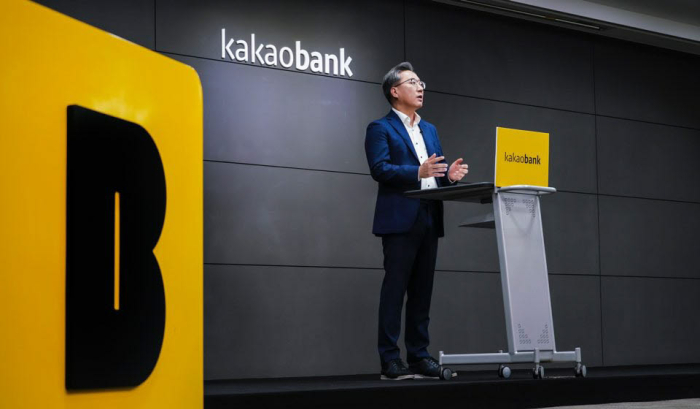Banking & Finance
KakaoBank falls out of Kospi top 10 on 3rd trading day
The valuation will largely depend on whether the investors see it as just another bank or a new financial platform
By Aug 10, 2021 (Gmt+09:00)
4
Min read
Most Read
LG Chem to sell water filter business to Glenwood PE for $692 million


Kyobo Life poised to buy Japan’s SBI Group-owned savings bank


KT&G eyes overseas M&A after rejecting activist fund's offer


StockX in merger talks with Naver’s online reseller Kream


Mirae Asset to be named Korea Post’s core real estate fund operator



KakaoBank Corp. has fallen out of the top 10 list on Kospi on Aug. 10, its third trading day, with Celltrion and Kia Corp. overtaking the company again.
The bank had made it to the tenth rank on Aug. 9, its second trading day, by growing 12.46% from the closing price of its listing day, surpassing the two companies in market cap. The closing price on Aug. 6 was 78,500 won ($68.45), rising 101.28% from its IPO price of 39,000 ($34.01).
The sharp growth on Aug. 9 was driven by the news last Friday that Morgan Stanley Capital International (MSCI) will include the company’s stock in its Emerging Markets (EM) index from Aug. 20 after the day’s trading session.
The rapid rise in the stock price is also fueling debate on its valuation. Its price-to-earnings ratio (PER) is 118.42, much higher than the banking industry leader KB Financial Group’s 5.44.
Those who are more optimistic on KakaoBank’s stock price outlook highlight that the company is a financial platform that has near-limitless potential for expansion. On the other hand, those with less optimism say that KakaoBank is simply just another bank.
KakaoBank, which has closed at 71,400 won ($62.12) per share on Aug. 10, is valued much higher in the stock market than analyst consensus estimates. The average figure from the four securities firms that specified a target price -- SK Securities, Yuanta Securities Korea, BNK Securities -- is 43,000 won ($37.47).
SK Securities whose target price is 64,000 won ($55.75) and Kyobo Securities with 45,000 won ($39.20) both calculated the valuation of KakaoBank by categorizing it as a financial platform. But their target prices are still lower than the high stock price that KakaoBank has been sustaining.
“KakaoBank’s stock price is so overheated that it’s extremely difficult to make any forecast. I have never run into such a case for a company in the banking and financial sector,” said an analyst.
Some analysts highlight that KakaoBank, to maintain the positive stock trend, must soon prove its ability as a financial platform by expanding into other business areas within the financial sector.
“KakaoBank can become the Amazon in Korea’s financial sector if it can stand strong as a ‘loan refinancing platform’ where users can easily compare interest rates and can freely purchase different loan products,” said analyst Seo Young-soo of Kiwoom Securities.
Others have highlighted that the new bank will likely face more stringent regulations.
“KakaoBank is different from Kakao and Naver, whose future growth potentials were reflected in their stock prices, in that it is still a bank and thus is not free from potential regulatory risks in the industry,” said research director Kim Hak-kyun of Shinyoung Securities.
The South Koran government and the financial regulators have lately been advising the country’s major banks to cut loans amid the fast growth of household loans. The government’s announced target is to maintain the annual growth rate of 5-6% in household loans. Some say that the government’s recent stance to reduce household loans may pose risk to KakaoBank’s growth.
Meritz Securities Co. also agreed on this view. Its research center chief Lee Kyung-soo said: “While KakaoBank possesses big data of customers, it cannot be free from its identity as a player in the banking industry, where only the business practices approved by the regulator is allowed.”
Others also noted that KakaoBank’s so-called new businesses that the company highlighted to the investors, such as housing loans, is still a traditional banking practice rather than an innovative business model that only digital platforms can engage in.
Some others in the securities industry are still optimistic about KakaoBank’s future business and valuation. They highlighted that the housing loans provided on the KakaoBank platform are not the same as those offered by the traditional banks.
“If the financial regulator allows the expansion of the loan refinancing platforms, KakaoBank will absorb demands for housing loan to a large degree based on its lower interest rates”, said analyst Seo Young-soo of Kiwoom Securities.
“From the growth of Kakao and Naver, we’ve already seen that platforms can potentially expand limitlessly. It’s not irrational for the investors who believe in KakaoBank’s platform power to invest in the company that has more than 10 times the PER of the traditional banks,” said Chung Myung-ji, the head of investment strategy at Samsung Securities Co.
Write to Sung-mi Shim and Ui-myung Park at smshim@hankyung.com
Daniel Cho edited this article.
More to Read
-

-
 IPOsTencent, Korea Value poised to see sixfold return from KakaoBank
IPOsTencent, Korea Value poised to see sixfold return from KakaoBankJul 27, 2021 (Gmt+09:00)
3 Min read -
 IPOsKakaoBank, Krafton, other heavyweights set to sizzle in hot IPO season
IPOsKakaoBank, Krafton, other heavyweights set to sizzle in hot IPO seasonJul 25, 2021 (Gmt+09:00)
4 Min read
Comment 0
LOG IN


